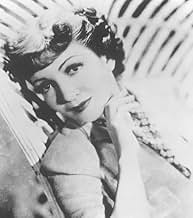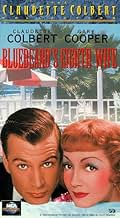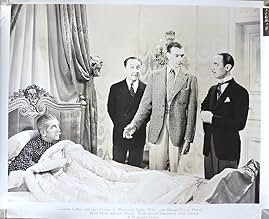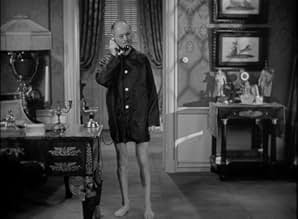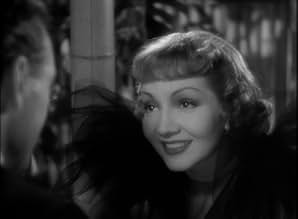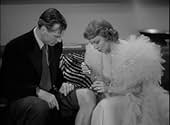NOTE IMDb
7,1/10
5 k
MA NOTE
Après avoir découvert que son fiancé milliardaire a déjà été marié et divorcé plusieurs fois, la fille d'un marquis sans le sou décide de le mater.Après avoir découvert que son fiancé milliardaire a déjà été marié et divorcé plusieurs fois, la fille d'un marquis sans le sou décide de le mater.Après avoir découvert que son fiancé milliardaire a déjà été marié et divorcé plusieurs fois, la fille d'un marquis sans le sou décide de le mater.
- Réalisation
- Scénario
- Casting principal
- Récompenses
- 2 victoires au total
Mariska Aldrich
- Nurse at Door
- (non crédité)
Leon Ames
- Ex-Chauffeur
- (non crédité)
Lenore Aubert
- Party Guest
- (non crédité)
Eugene Borden
- Waiter on the Stairs
- (non crédité)
Barlowe Borland
- Uncle Fernandel
- (non crédité)
Avis à la une
There is something about seeing a movie in a good, old-fashioned movie house that adds enormous appeal to every picture. I, fortunately enough, was able to see at Film Forum in New York City a pair of Ernst Lubitsch comedies during their three week tribute to the legendary director. The double feature I attended was a screening of Lubitsch's 1938 comedy Bluebeard's Eighth Wife and the pre-Code classic Design for Living, neither of which I had seen before. Everything I read of Design for Living praised the film, but I could not find a good review anywhere for Bluebeard's Eighth Wife. Leonard Maltin disliked it.VideoHound, too, gave the comedy a low rating.its IMDB score was not complimentary.and Pauline Kael (not a great surprise) blasted the film in her scathing review. So, when I went into the city that day I was expecting to enjoy Bluebeard's Eighth Wife only slightly and love Design for Living completely. Bluebeard's Eighth Wife (which was showing first) began, as the eccentrics who populate the cinema took their seats and the thirties music subsided. `Adolph Zukor presents Claudette Colbert and Gary Cooper in Ernst Lubitsch's Bluebeard's Eighth Wife,' the title card read. Then the picture opened with a hilarious scene: Cooper wants to buy a pair of pajama tops, but he doesn't want any part of the bottoms! He gets into a squabble with the clerk, who seeks the help of his higher bosses, and their seems to be no end to the argument. Enter Claudette Colbert, one of thirties cinema's most beautiful, charming, and talented personalities. `I'll take the bottom,' she kindly intercedes. And there you have perhaps screwball comedies finest `meet cute' ever. The film kept my interest wonderfully.I found myself laughing almost constantly. When Colbert discovers, just before a family portrait is taken, that her groom-to-be has been married seven times, the entire theatre broke into histerics. When she bargains for money immediately after she gets over her shock, the laughs (which still haven't ceased) intensify. And Edward Everett Horton milked some hilarious reactions out of the script as well. When Cooper takes inspiration from Shakespeare's The Taming of the Shrew in disciplining his wife by slapping her in the face, I could not control my laughter when she slapped him back. And the drunk scene with the scallions is one of Claudette Colbert's funniest comic scenes. The greatest comic moment of the film came when Colbert highers a boxer to `teach her husband a lesson.' In pure screwball fashion, he knocks out the wrong man, instead putting her friend David Niven into a cold sleep. He awakes as Cooper is arriving. In order to cover up the situation, Colbert herself, in a moment of strong sexiness, puts her fist up to Niven, asks: `Where did that man hit you? Here? Right here? Right here?' and then BAM! knocks him out again! The film was wonderful, from beginning to end it was a perfect delight. I loved Design for Living, too, though I dare say I think for sheer laughs and entertainment Bluebeard's Eighth Wife was the better and more enjoyable film. There is some charm of seeing a vintage film on the large screen. And in the presence of others laughing, one feels more comfortable doing so himself. That is, perhaps, why I felt the way I did about Bluebeard's Eighth Wife.
Oh Lubitsch how we needed you. Others could elicit fiery performances from actors, captivate with riveting story or lavish us with sets and camera magic. These usually require to be propped up with some effort, but what Lubitsch does simply requires letting go of, in particular letting go of our need to prop up fiction a certain way.
Usually understood as a gift for wit, his famed 'Lubitsch touch' is actually a mastery of something else, spontaneous illogicality. I have written about him in a few other posts so will not bore you here. It's the continuous shift of context, the dismantling of our expectation that story plays out a certain way.
The story could be anything, here a man and woman court each other while vacationing in the French Riviera. He's the blustering American type who won't take no and won't tiptoe around European niceties. She's elegant and smart but will not stoop to be wowed by money like her shyster father.
In the usual mode, they would brush and bounce off each other whilst trying to top each other for control over the story. This as hardwon love that surprises. That's fine, plenty of enjoyable films were being made in this time, what we now know as screwball. For me it's all a matter of how we brush, how much narrative space the players create by pushing and pulling, in which self can take shape, actual visible shape, as the story we watch. Capra has a very agile touch in It Happened One Night. I happen to find His Girl Friday coarse, par the course for Hawks.
In Lubitsch's world, we shift and shift again in a jazz merry-go-round of elusive self. Here's some of it. They meet as strangers in a store, cooperating over trying to buy pyjamas. He decides he's smitten, but uses money to come close to her. So what happens? She agrees to be bought as a wife but gives him a thankless marriage for it, although in love herself.
This is lovely work, clean, vibrant. Some if are just gags, like having married seven times before her. But quite a bit of it is that wondrous surprise where emotions express themselves in paradoxical ways.
Usually understood as a gift for wit, his famed 'Lubitsch touch' is actually a mastery of something else, spontaneous illogicality. I have written about him in a few other posts so will not bore you here. It's the continuous shift of context, the dismantling of our expectation that story plays out a certain way.
The story could be anything, here a man and woman court each other while vacationing in the French Riviera. He's the blustering American type who won't take no and won't tiptoe around European niceties. She's elegant and smart but will not stoop to be wowed by money like her shyster father.
In the usual mode, they would brush and bounce off each other whilst trying to top each other for control over the story. This as hardwon love that surprises. That's fine, plenty of enjoyable films were being made in this time, what we now know as screwball. For me it's all a matter of how we brush, how much narrative space the players create by pushing and pulling, in which self can take shape, actual visible shape, as the story we watch. Capra has a very agile touch in It Happened One Night. I happen to find His Girl Friday coarse, par the course for Hawks.
In Lubitsch's world, we shift and shift again in a jazz merry-go-round of elusive self. Here's some of it. They meet as strangers in a store, cooperating over trying to buy pyjamas. He decides he's smitten, but uses money to come close to her. So what happens? She agrees to be bought as a wife but gives him a thankless marriage for it, although in love herself.
This is lovely work, clean, vibrant. Some if are just gags, like having married seven times before her. But quite a bit of it is that wondrous surprise where emotions express themselves in paradoxical ways.
For some perverse reason best known to themselves these IMDb boards seem reluctant to credit the great Billy Wilder as co-scriptwriter on at least two (this one and Ninotchka) of his early classics when any buff can detect the Wilder hand at work. As it happens this represented the first time he was teamed with Charles Brackett (who DOES get a credit) and it was a great start. One commenter has noted how satisfying it is to see these type of films in old-fashioned cinemas and I couldn't agree more. In Paris one of the smaller Revival houses shows in one of its salles a more or less continuous Lubitsch retrospective and I'm pleased to report that this played to a very appreciative audience right across the age spectrum though I doubt whether any were actually alive when it was first released in 1938. The famous Wilder schtick the meet-cute is particularly tasty here when millionaire but-careful-with-it Cooper attempts to buy half a set of pajamas in a department store on the Riviera and meets with sales resistance until Claudette Colbert turns up and agrees to buy the other half. The gag is milked even more when, having exhausted the chain of command at the store itself the manager places a call to the owner, who is in bed and leaves it to reveal that he, too, is only wearing the top half of pajamas. The film is full of sight-gags like this balanced with verbal wit which makes it just about perfect. Claudette Colbert is only terrific and gets great backing from Edward Everett Horton as her impoverished titled father. David Niven in fourth billing has some funny 'business' as does Franklin Pangborn and if Gary Cooper is not up to his role lacking as he does the verbal dexterity and sophisticated persona that Wilder scripts called for at this stage of his career well, you can't have everything and what you DO have is darned near perfect.
When my colleague suggested watching this movie, she showed me the Shakespeare-reading scene. As I found it really amusing, I later watched the whole piece. And I didn't regret the time I spent! To say honestly, I'm not the old movie addict who knows all the history of American and European film industry back to black-and-white silent pictures and being woken up at night can list all the prominent actors and directors. I'm not into movies at all, which is the reason that my watching list is highly haphazard with British series followed up by French melodramas and historical documentaries. Bluebeard's Eighth Wife is a really nice piece featuring good-looking actors, jokes, funny without the slightest trace of vulgarity. The plot is a turned inside out ''Taming of the Shrew'', and no wonder it appears as a book the main hero reads, as I mentioned at the beginning of my review. However, it is common knowledge that not the plot itself, but its presentation matters, and in this case it does not undermine expectations. The naivety of the old times has a special charm, especially the good old happy end, so enjoy!
Ernst Lubitsch is the guiding hand behind "Bluebeard's Eighth Wife," a 1938 comedy starring Claudette Colbert and Gary Cooper. The screenplay was written with a light touch by Brackett and Wilder.
The story concerns a wealthy man, Michael Brandon (Cooper), who meets the very attractive Nicole De Loiselle (Colbert) in a Parisian men's department store. Brandon wants to buy the top of the pajamas, as that's what he sleeps in, but the clerk insists that he buy the entire set. Nicole enters and buys the pants.
Nicole's father (Edward Everett Horton) is a penniless marquis, trying to sell a project to Brandon, who isn't interested. The marquis then attempts to get him to buy a Louis IV bathtub. When he realizes that Nicole is the marquis' daughter, the marquis sees immediately that there is interest and tries to get them together. After all, he's loaded, and the hotel bill is due.
Finally, the couple does become engaged and of course the marquis brings in his entire family at his expense for the wedding. While everyone is gathering for a photograph, some white stuff falls out of Michael's suit. "What is that?" she asks. "It's rice," he says. "Don't you use it at weddings? It's supposed to bring good luck." "Did your bride and groom have good luck?" she asks. "Well," he says, "we had a pleasant six months."
She then finds out he's been married seven times. After renegotiating some sort of prenup he has set up, she goes through with the wedding, but they live separate lives.
For some reason, people put this film in the same category as I Met Him in Paris because they're on the same DVD and they both take place in Paris. I Met Him in Paris is not a Lubitsch film and has some problems. This film has a fine script, zips along at a great pace, and has some wonderful scenes. I Met Him in Paris didn't really pick up until the second part.
Gary Cooper and Claudette Colbert are delightful. It's hard to believe that someone like Gary Cooper actually existed - tall, drop dead gorgeous, and a cowboy to boot. Talk about your perfect man. And what a smile.
Colbert is flawless in acting and in beauty - I saw her up close in 1974 and she looked the same as she did in this film. For as much success that she had, I don't think she ever received the credit for her dramatic work that she deserved, though she did for her comedy.
In her last appearance, in The Two Mrs. Grenvilles, she played an actual person, Elsie Woodward (name changed in the movie), and people who knew Elsie said Colbert was totally the character.
I don't think this is Lubitsch's best, but it's still delightful. How can you miss with those stars, that director, and those writers.
David Niven has a supporting role as an employee of Brandon's who is also a friend of Nicole's. He's very funny.
The story concerns a wealthy man, Michael Brandon (Cooper), who meets the very attractive Nicole De Loiselle (Colbert) in a Parisian men's department store. Brandon wants to buy the top of the pajamas, as that's what he sleeps in, but the clerk insists that he buy the entire set. Nicole enters and buys the pants.
Nicole's father (Edward Everett Horton) is a penniless marquis, trying to sell a project to Brandon, who isn't interested. The marquis then attempts to get him to buy a Louis IV bathtub. When he realizes that Nicole is the marquis' daughter, the marquis sees immediately that there is interest and tries to get them together. After all, he's loaded, and the hotel bill is due.
Finally, the couple does become engaged and of course the marquis brings in his entire family at his expense for the wedding. While everyone is gathering for a photograph, some white stuff falls out of Michael's suit. "What is that?" she asks. "It's rice," he says. "Don't you use it at weddings? It's supposed to bring good luck." "Did your bride and groom have good luck?" she asks. "Well," he says, "we had a pleasant six months."
She then finds out he's been married seven times. After renegotiating some sort of prenup he has set up, she goes through with the wedding, but they live separate lives.
For some reason, people put this film in the same category as I Met Him in Paris because they're on the same DVD and they both take place in Paris. I Met Him in Paris is not a Lubitsch film and has some problems. This film has a fine script, zips along at a great pace, and has some wonderful scenes. I Met Him in Paris didn't really pick up until the second part.
Gary Cooper and Claudette Colbert are delightful. It's hard to believe that someone like Gary Cooper actually existed - tall, drop dead gorgeous, and a cowboy to boot. Talk about your perfect man. And what a smile.
Colbert is flawless in acting and in beauty - I saw her up close in 1974 and she looked the same as she did in this film. For as much success that she had, I don't think she ever received the credit for her dramatic work that she deserved, though she did for her comedy.
In her last appearance, in The Two Mrs. Grenvilles, she played an actual person, Elsie Woodward (name changed in the movie), and people who knew Elsie said Colbert was totally the character.
I don't think this is Lubitsch's best, but it's still delightful. How can you miss with those stars, that director, and those writers.
David Niven has a supporting role as an employee of Brandon's who is also a friend of Nicole's. He's very funny.
Le saviez-vous
- AnecdotesThis was the first collaboration of director Ernst Lubitsch with writers Charles Brackett and Billy Wilder. At their first production meeting, Lubitsch posed this question: "How do the boy and girl get together?". Wilder promptly suggested that the opening scene should be in the men's shop of a department store. "The boy is trying to buy a pajama," he extemporized, "but he sleeps only in the tops. He is thrifty so he insists on buying ONLY the tops. The clerk says he must buy the pants, too. It looks like a catastrophe. Then the girl comes into the shop and buys the pants because she sleeps only in the pants." Lubitsch and Brackett were enchanted with this idea. Months later, they discovered that Wilder himself was a pajama tops-only sleeper and had been contemplating this idea for months, waiting for a chance to use it in a comedy.
- GaffesWhen Nicole shuts the door to her part of the apartment to keep Michael out, the door can be heard being locked. However, there is no keyhole or lock visible on either side of the door.
- Citations
Nicole de Loiselle: [sarcastically] Mr. Brandon, you're terrific. You're gigantic! You're - you're breathtaking. I wish someone would tell you what I really think of you.
- ConnexionsFeatured in Mark Kermode's Secrets of Cinema: The Romcom (2018)
- Bandes originalesHere Comes Cookie
(1935) (uncredited)
Music and Lyrics by Mack Gordon
Performed by Gary Cooper (vocal and piano)
Meilleurs choix
Connectez-vous pour évaluer et suivre la liste de favoris afin de recevoir des recommandations personnalisées
- How long is Bluebeard's Eighth Wife?Alimenté par Alexa
Détails
- Date de sortie
- Pays d’origine
- Langues
- Aussi connu sous le nom de
- Bluebeard's Eighth Wife
- Lieux de tournage
- Société de production
- Voir plus de crédits d'entreprise sur IMDbPro
Box-office
- Budget
- 1 300 000 $US (estimé)
- Durée1 heure 25 minutes
- Couleur
- Rapport de forme
- 1.37 : 1
Contribuer à cette page
Suggérer une modification ou ajouter du contenu manquant

Lacune principale
By what name was La huitième femme de Barbe-bleue (1938) officially released in India in English?
Répondre

